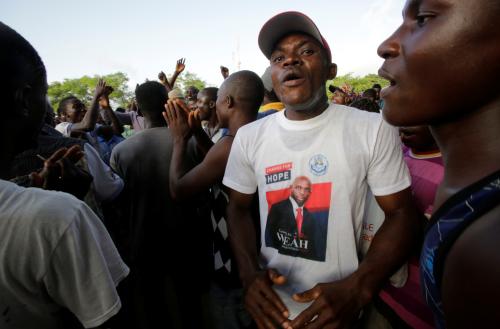Last summer, which already seems like a long time ago, it was commonplace to wonder why anyone would want to be the next president of the US, given the quantity, complexity and difficulty of the foreign policy problems awaiting him. He will have to deal with dangerously unstable countries such as Iraq, Afghanistan, and Pakistan; hostile ones like Iran and North Korea; a Russia that is back in the business of invading neighbouring states and the existential threats of climate change and nuclear proliferation.
Then came the “Black September” of the era of globalisation. By the end of that month, the turmoil on Wall Street had mushroomed into a worldwide crisis that will be the focus of a 20-nation emergency summit hosted by President George W. Bush on November 15.
The need to stabilise credit markets around the world is not only the latest, most visible test of the international system – it is also the one with most political impact in the US, now that the real economy is suffering. Mr Bush’s successor will confront a classic example of what management consultants call “the tyranny of the urgent”: the tendency of an immediate catastrophe to divert energy and attention from festering or potential ones.
Yet the pre-September to-do list that awaits the next leader in Washington is still a must-do list. It includes six other imperatives that should not, in the name of prioritising problems, be downgraded or deferred.
These are: establishing an effective climate control regime as a replacement for, and a quantum improvement on, the Kyoto protocol when it expires four years from now; stopping, then reversing, the erosion of the nuclear non-proliferation regime; resuscitating the world trade order after the stalling of the Doha round; improving the efficacy of international mechanisms for fighting poverty; preventing or preparing, if necessary, to deal with pandemics; and, finally, establishing new ways to handle failed and failing states and the non-state actors that they breed, including terrorist organisations.
Hence an overarching challenge for the next president will be a high order of multitasking. That will mean minimising the extent to which these tasks – each in its own way urgent – compete with one another. The only way to do that is to find ways of making progress on one front in a manner that helps on others. That can be done if the solutions are executed in ways that take account, and make a virtue, of the inter-relationship of the problems.
Take, for instance, the four-way connection that links the financial crisis now dominating the headlines with three that it has shoved to the back pages. A move towards more effective regulation of financial transactions and credit flows could establish useful precedents, innovative methods and fresh infusions of political will that could then be used in jump-starting progress in regulating greenhouse gas emissions, rescuing the Nuclear Non-Proliferation Treaty and negotiating a successful round of trade talks.
In fact, an effective international financial system is a precondition for the revival of a trading system that will enable the world to deal with more extensive carbon trading. Moreover, since humanity must ultimately reduce carbon emissions rather than just trade in them, it is going to have to rely heavily on nuclear-generated power. That will provide a further incentive to strengthen non-proliferation measures.
The ominous converse of these linkages is also true. Since the international system depends on the free, reliable and orderly flow of financial resources, failure to solve the current mess will stymie progress in those other areas – trade, climate and proliferation. The whole system would face both paralysis and chaos.
By the same token, if, in our effort to mitigate global warming, we proliferate nuclear reactors for peaceful purposes but fail to institute the proper safeguards on material that can be used to make bombs, we could trigger a free-for-all competition over nuclear weaponry and risk a chain reaction of nuclear wars. Finally, if we are unable to curb global warming, it will not matter over the long run whether we are brilliant in fixing other parts of the human enterprise that are broken.
Add up these tasks and the bottom line is clear – the biggest job for the new US administration is to find better methods of governing an interdependent world. That is the only way to ensure that the upside of globalisation prevails over the downside.
The Brookings Institution is committed to quality, independence, and impact.
We are supported by a diverse array of funders. In line with our values and policies, each Brookings publication represents the sole views of its author(s).



Commentary
Op-edAmerica’s Next President Must Master the Tyranny of the Urgent
November 2, 2008